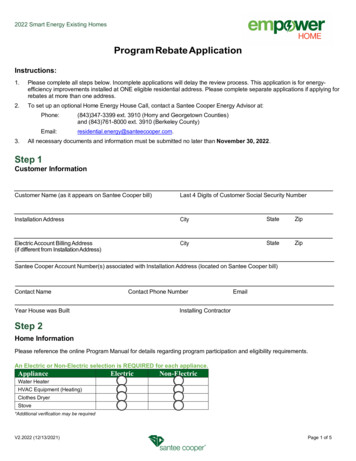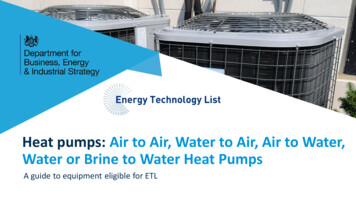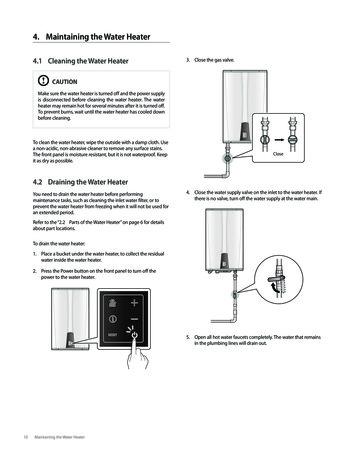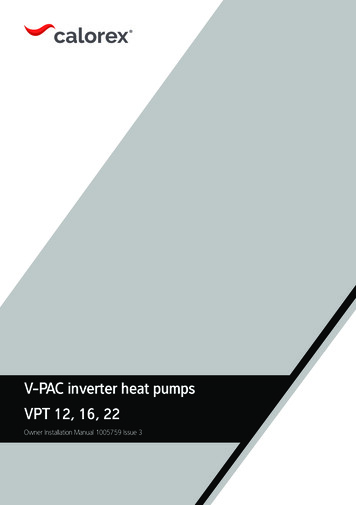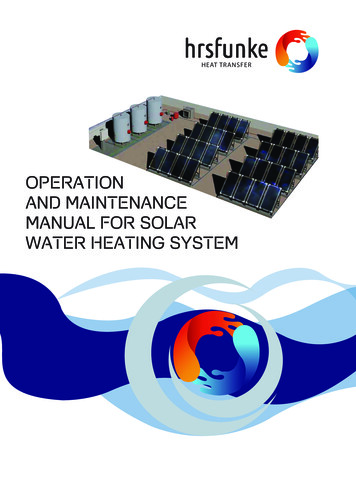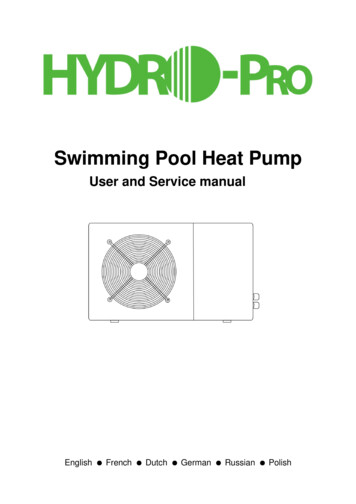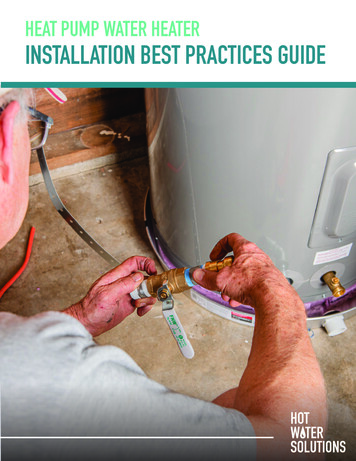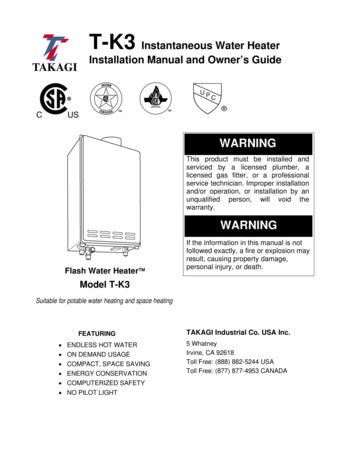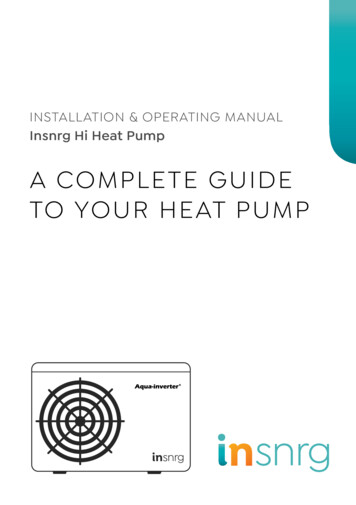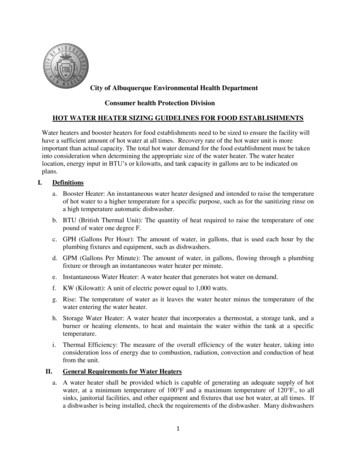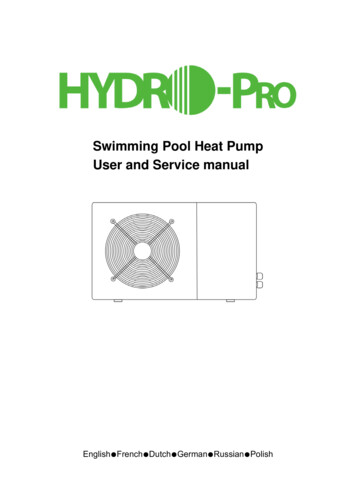
Transcription
Heat Pump Water Heater Modelingin EnergyPlusBuilding America Residential EnergyEfficiency Stakeholder MeetingEric WilsonCraig ChristensenMarch 1, 2012NREL is a national laboratory of the U.S. Department of Energy, Office of Energy Efficiency and Renewable Energy, operated by the Alliance for Sustainable
Heat Pump Water Heater Modeling MotivationModelingIssuesResults2
Gap: Existing analysis tools cannot accuratelymodel HPWHs with reasonable runtime.3
What have we achieved so far?Field Monitoring14 xLaboratory Evaluations4
Closing the GapField MonitoringCARB14 xLaboratory Evaluations6 sec timestephourly timestep5
Why is modeling important? Performance varies:Can’t just use EF System interactionooHPWH affects buildingheating and coolingSpace conditionsaffect HPWHperformance6
Modeling Goals Manage RisksAccuracyo Run timeo Occupant satisfactiono Flexibility to explore the effects of:Tank location, volume, setpointo Hot water use patternso HPWH vs. all other measures(optimization)7
Heat Pump Water Heater Modeling MotivationModelingIssuesResults1) Tank Stratification2) Draw Profile3) Performance Maps4) Sizing8
1) Tank StratificationExisting ModelEnergyPlus HPWH mixed tankMixedtankTmains9
1) Tank StratificationExisting ModelEnergyPlus HPWH mixed tankRealistic PerformanceStratified tankMixedtankTmainsStratifiedtankTmains10
1) Tank StratificationExisting ModelEnergyPlus HPWH mixed tankRealistic PerformanceStratified tank1) Colderwater suppliedImplications ofusing a mixedtank model MixedtankStratifiedtank2) warmer coil worse performanceTmainsTmains11
1) Tank StratificationNew ModelTwo tanks in SeriesRealistic PerformanceStratified tankMixedtankStratifiedtankTmainsMixedtankTmains12
2) Draw ProfileExisting ModelSmooth Draw ProfileHourly TimestepHPWH PowerHot Water Use13
2) Draw ProfileExisting ModelSmooth Draw ProfileHourly Timestep14
2) Draw ProfileExisting ModelRealistic PerformanceSmooth Draw ProfileHourly TimestepDiscrete Draw Events6 Second Timestep 4.5 kWIf these draw profiles are used for an annual simulation HPWH EnergyHPWH Energy14 MBtu/yr23 MBtu/yr 1.0 kW15
2) Draw ProfileNew ModelRealistic PerformanceHourly Averaged Discrete DrawsHourly TimestepDiscrete Draw Events6 Second Timestep 4.5 kW 1.0 kW16
2) Draw ProfileNew ModelRealistic PerformanceHourly Averaged Discrete DrawsHourly TimestepDiscrete Draw Events6 Second Timestep 4.5 kWHourly Time SeriesTotal Hot Water Flow Rate (cfm)0.100.080.060.040.020.009101112February131415 1.0 kW17
2) Draw ProfileNew ModelRealistic PerformanceHourly Averaged Discrete DrawsHourly TimestepDiscrete Draw Events6 Second Timestep 4.5 kW(element)With the new model draw profile, annual results match:HPWH EnergyHPWH Energy 23 MBtu/yr23 MBtu/yr 1.0 kW(heat pump)18
3) Performance MapsExisting ModelConstant Performance?19
3) Performance MapsExisting ModelRealistic PerformanceManufacturer SpecificMfgr 1Mfgr 2Mfgr 3Constant Performance?(constant 67 F, 50% RH air)20
3) Performance MapsNew ModelGeneric Normalized Performance MapRealistic PerformanceManufacturer Specific 1 at rating pointMfgr 1Mfgr 2Mfgr 3(constant 67 F, 50% RH air)21
3) Performance MapsNew ModelGeneric Normalized Performance MapRealistic PerformanceManufacturer SpecificMfgr 1Mfgr 2Mfgr 3(constant 67 F, 50% RH air)22
3) Performance MapsNew ModelGeneric Normalized Performance MapRealistic PerformanceManufacturer SpecificUse rated values to getspecific performance map:Mfgr 1Mfgr 2Mfgr 3(constant 67 F, 50% RH air)23
4) HPWH SizingExisting Model No existing method forHPWH sizingTank Volume (gal)Conventional Electric WH Sizing:706050403020100Range f(# baths)1234# Bedrooms524
4) HPWH SizingExisting ModelRealistic Performance No existing method forHPWH sizingTank Volume (gal)Conventional Electric WH Sizing:706050403020100AprilRange f(# baths)1234# Bedrooms5Reduced capacity to meet DHWdemand (vs. conventional WHs)Function of:Climateo # bedroomso Tank Volumeo Setpoint Temperatureo25
4) HPWH SizingNew Model“Percent Unmet Showers”OptionRealistic PerformanceDisplay VariableAprilReduced capacity to meet DHWdemand (vs. conventional WHs)Percent Unmet ShowersFunction of: Function of climate, # bedrooms, tank volume, setpoint Estimate of shower time 110 F Helps users select acceptable options Sensitive to hot water use patterns so will vary fromone set of occupants to the nextClimateo # bedroomso Tank Volumeo Setpoint Temperatureo26
Heat Pump Water Heater Modeling MotivationModelingIssuesResults27
Model CalibrationCalibrated to TRNSYS results 5%12 cases: Chicago, Houston;1, 3, 5 BR;50, 80 gal28
Model CalibrationDaily System COPChicago, 50 galUnfinished BasementDaily Draw Volume (gal/day)29
Model CalibrationDaily System COPChicago, 50 galUnfinished BasementDaily Draw Volume (gal/day)30
Model CalibrationDaily System COPHouston, 50 galGarageDaily Draw Volume (gal/day)31
Model CalibrationDaily System COPHouston, 50 galGarageDaily Draw Volume (gal/day)32
BEoptE Modeling ResultsHPWH vs. Electric ResistanceWith Cooling Impact (Air-Source HP)Model: A-BSetpoint: 120-140 FLocation: Conditioned, Unconditioned33
BEoptE Optimization ResultsSpace Conditioning Air-Source Heat PumpMaximum Energy Savings(state average utility rates,Nat’l avg Source/Site ratio)Lowest Life-Cycle Cost1 BR3 BR5 BR1 BR3 BR5 c/HPElec/HP(“HPWH” includes various models/volumes, locations, and setpoints)Space Conditioning Gas FurnaceMaximum Energy SavingsLowest Life-Cycle Cost1 BR3 BR5 BR1 BR3 BR5 Gas” includes: standard, premium, tankless, or tankless condensing.)34
ConclusionsHPWH model for EnergyPlus/BEopt Market Benefits:ooooIntegrated with existing toolFastFlexibleAccurate35
ConclusionsLessons Learned Rated EF for HPWHs not good indicator of performanceDon’t use “smooth” BA HSP draw profile for HPWH testingControl logic mattersSizing HPWHs for adequate HW delivery: many factorsRemaining Issues Better draw profiles for HPWH modeling/testing Performance in enclosed spaces36
For more information:Laboratory Testing Report:Sparn, B.; Hudon, K.; Christensen, D. (2011). Laboratory Performance Evaluation ofResidential Integrated Heat Pump Water Heaters. 77 pp.; NREL Report No. TP-550052635.TRNSYS Modeling Results:Maguire, J. (2011). A Parametric Analysis of Residential Water Heaters. Master’sThesis. Boulder, CO: University of Colorado.
Hot water use patterns HPWH vs. all other measures . 1) Tank Stratification . 2) Draw Profile . 3) Performance Maps . 4) Sizing . Modeling Issues . 9 . 1) Tank Stratification . Mixed . tank . T mains. Existing Model . EnergyPlus HPWH mixed tank . 10 . 1) Tank Stratification . Stratified tank . 11 1) Tank Stratification Mixed . tank . T .
